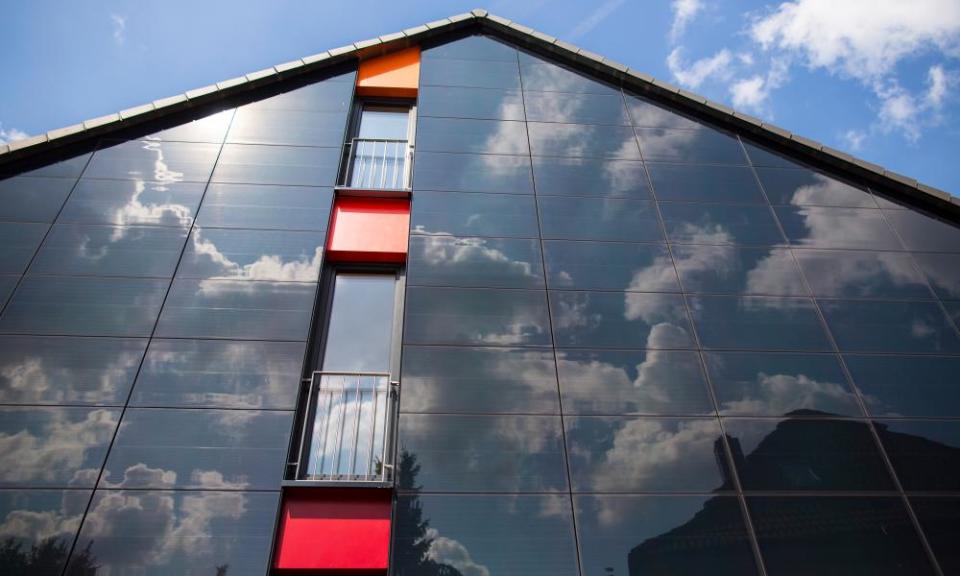‘New jobs, new industries, new wealth’: Kevin Rudd’s vision for a green recovery out of the pandemic

Kevin Rudd has called for solar panels to be made compulsory on all new buildings and increased incentives to be offered to households that do not yet have them as part of a “genuinely green recovery” from recession.
Speaking at an Australian National University event on Monday, the former prime minister repeated his 2007 declaration that climate change was the “great moral challenge of our time” and accused the Morrison government of putting jobs and long-term living standards at risk by failing to deal with the issue as promised under the Paris agreement.
Rudd said the government could have used the coronavirus pandemic as a spur to accelerate the shift to becoming a zero emissions economy, but had instead used it as an excuse to delay action further. It was evidence Australia had become “the complacent country” on the issue despite the experience of last summer’s catastrophic bushfires, he said.
“Besides the United States under [Donald] Trump and Brazil under [Jair] Bolsonaro, we in Australia are the only major economy that does not take the need for action on climate change seriously. Nor do we recognise the economic opportunities that will come with that action. I would argue this is bad company to keep,” Rudd said as part of his keynote address at the Wilson Dialogue.
“I fear that seeking to untangle our carbon-intensive economy much later than the rest of the world could in fact be what causes the next recession in Australia as the global economy increasingly walks away from fossil fuel dependency.”
Related: 'Culture of fear': why Kevin Rudd is determined to see an end to Murdoch's media dominance
Rudd said his vision for a green recovery from the pandemic included large-scale investment in renewable energy to position as a clean energy superpower, saying there was evidence it could create “new jobs, new industries, new wealth” while providing clean energy at home and creating clean energy technology that could be exported.
He said it should include investments in projects such as the Asian Renewable Energy Hub, which proposes a massive green hydrogen development in the Pilbara, and contrasted clean energy opportunities with what he said was the government’s obsession with a “gas-led recovery”. He said it would “kiss goodbye” any hope of Australia meeting its commitments under the Paris agreement. “It is the modern-day equivalent of a defence plan to buy more horses and bayonets because they worked in the past,” he said.
Rudd backed a $20bn proposal by the Labor leader, Anthony Albanese, to rebuild the power grid and invoked the advice of his former Treasury head, Ken Henry, during the global financial crisis to “go hard, go early and go households” by also making solar panels mandatory on all new structures, offering increased incentives for retrofitting the three-quarters of existing homes without panels and considering subsidising the cost of insulation for social housing.
“It would immediately put money in the pockets of our countries’ most vulnerable by wiping out huge parts of their electricity bills,” he said.
Rudd joined the former Liberal prime minister, Malcolm Turnbull, in supporting a proposal by Beyond Zero Emissions, an energy and climate change thinktank, saying it could create 100,000 jobs over two years, 70% of them in regional areas, while increasing real wages. It would involve accelerating private and public investment in renewable energy, clean buildings, clean transport, manufacturing and land use that will happen in the years ahead anyway.
The former Labor leader was accused of walking away from his commitment to tackle the climate crisis in 2010 when he shelved plans to introduce a carbon pollution reduction scheme after the Copenhagen climate conference failed and Tony Abbott, a climate denier, became Liberal leader. It played a part in his being ousted as prime minister by his Labor colleagues a short time later. A carbon-pricing scheme was later introduced under his successor, Julia Gillard, with crossbench support before being repealed by the Abbott led-Coalition in 2014.
Rudd is waging a campaign against Rupert Murdoch’s News Corp, having launched a petition calling for a royal commission into the company’s dominance of Australia media.
By Monday night the petition had more than 330,000 signatures, but it is unlikely to be acted upon. Unlike other countries, including Britain, Australia has no threshold of signatures that requires a petition to be debated in parliament.
In his speech, Rudd urged people to “launch, collectively, a national fusillade against the Murdoch media”, which he said had been the “echo-chamber of climate change denialism for the best part of a decade”.

 Yahoo News
Yahoo News 